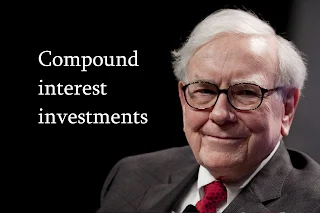Warren Buffett, the legendary investor, needs no introduction. His name is synonymous with wealth, wisdom, and remarkable success in the world of finance. But what's the secret to his unparalleled fortune? While many factors contribute to Buffett's success, one crucial element stands out: the power of compound interest. In this post, we'll explore how Warren Buffett's journey to infinite wealth was shaped by the magic of compounding and what valuable lessons we can extract from his financial wisdom.
The Snowball Effect of Compounding:
At its core, compound interest is a straightforward concept with profound implications. It's like rolling a small snowball down a hill: as it descends, it accumulates more snow with each revolution, transforming into a massive snow boulder by the time it reaches the bottom. Similarly, compound interest allows your money to grow exponentially over time. The interest you earn on your investments is reinvested, generating even more interest, leading to an ever-increasing snowball effect of wealth accumulation.
Mr. Early vs. Mr. Late: A Compounding Tale:
Let's illustrate the power of compounding with a hypothetical scenario. Meet Mr. Early and Mr. Late, both with aspirations of retiring at 60. Mr. Early starts investing at 25, contributing $5,000 monthly with a 15% annual interest rate for 35 years. Meanwhile, Mr. Late begins at 35, investing $15,000 monthly at the same rate for 25 years. On the surface, it might seem like Mr. Late's larger contributions would lead to a more substantial retirement fund. However, the outcome is surprising. Mr. Early's disciplined, early investing approach results in a staggering $73.4 million in retirement funds, while Mr. Late, despite contributing more, ends up with only $48.7 million. This striking difference underscores the critical importance of starting early in the world of compounding.
Warren Buffett's Journey to Infinite Wealth:
Warren Buffett's story is the embodiment of the power of compounding. He began investing seriously at the age of 10 and, by the time he was 30, had already accumulated a net worth of $1 million (adjusted for inflation). Fast forward to today, at the age of 90, his net worth exceeds a staggering $81 billion. A significant portion of his wealth was amassed after his 50th birthday, proving that the true magic of compounding unfolds over the long term.
Maximizing Compound Interest:
To harness the full potential of compounding, it's crucial to adopt the right strategies. Look at Buffett's investment portfolio, and you'll notice a preference for stocks that pay dividends. These stocks offer another layer of compounding as dividends are reinvested, generating more dividends in a virtuous cycle. Whether you're saving for short-term goals or investing for the long haul, compound interest can be your best ally. Embrace it, nurture it, and let it work tirelessly to grow your wealth.
The Takeaway - Why Don't More Investors Emulate Buffett?
So, why don't more investors follow in Warren Buffett's footsteps? The answer lies in underestimating the profound impact of starting early and staying the course. Compound interest rewards patience and discipline. It's a long-term game, and those who prioritize short-term gains often miss out on the immense potential it offers. The lesson here is clear: time is your most valuable asset when it comes to compounding wealth.
Conclusion:
In conclusion, Warren Buffett's remarkable wealth is a testament to the power of compounding. His journey serves as an inspiration for all of us to start early, stay disciplined, and let the snowball of compound interest work its magic over time. By applying these timeless principles to our own financial strategies, we can take significant steps toward securing our financial future and achieving our wealth-building goals. So, why wait? Start today and watch your wealth grow with the unstoppable force of compound interest.












0 Comments